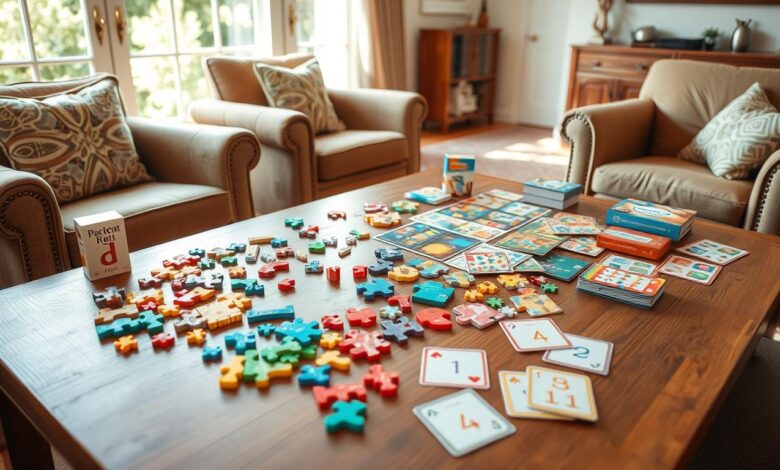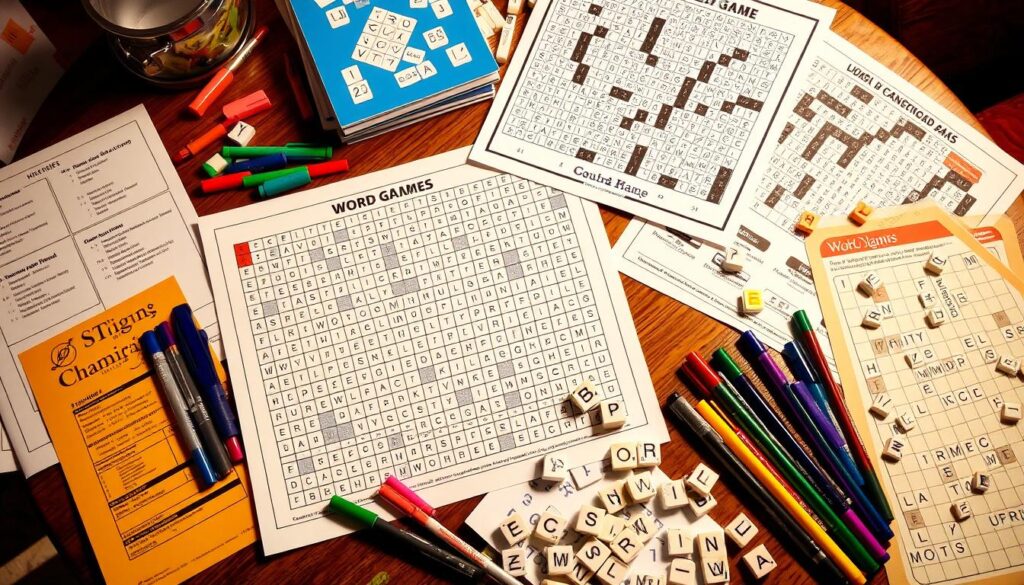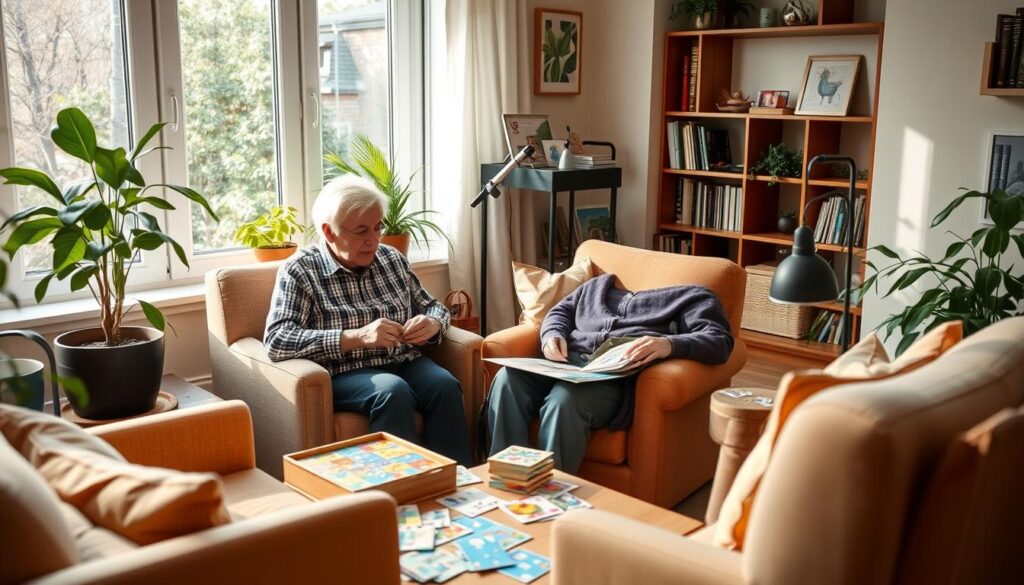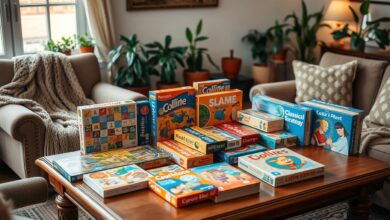Pattern Recognition Games For Elderly: Brain Training

As we get older, keeping our minds sharp becomes essential. Physical exercise is important, but so is engaging in activities that challenge our brains. Pattern recognition games for elderly offer an enjoyable way to improve cognitive function, enhance memory, and maintain mental sharpness into old age.
These games are not only fun but also help combat the effects of aging on the brain. They encourage seniors to stay mentally active while fostering a sense of accomplishment and joy.
Table of Contents
Understanding Brain Training and Cognitive Health in Seniors
Keeping our brains healthy is key as we age. Our brains change, and we might slow down in our 20s and 30s. But, doing brain exercises can slow down these changes and even make our brains better.
The Science Behind Mental Stimulation
Mental exercises are vital for seniors. They help build a brain reserve, lowering the risk of dementia and Alzheimer’s. Activities like puzzles, word games, and card games boost problem-solving and memory.
A study in the Journal of the American Geriatrics Society found that seniors who did brain training got better at memory and solving problems. They were faster at processing information than those who didn’t.
Benefits of Regular Brain Exercise
Doing different brain-stimulating activities is good for seniors. For example, playing card games like Solitaire, Bridge, and Poker can improve thinking and memory. Number games like Sudoku also help with logical thinking and have been shown to improve brain function in older adults.
How Cognitive Function Changes with Age
Playing mind games doesn’t stop dementia or Alzheimer’s, but they’re good for the brain. Adults who play mentally challenging games often are less likely to get dementia, a study in the New England Journal of Medicine found. Knowing how our brains change with age helps us keep them sharp.
“Consistently dedicating at least 15-20 minutes daily to brain game activities is crucial for long-term cognitive health benefits.”
Pattern Recognition Games for Elderly: Essential Types and Benefits
As we get older, keeping our minds sharp is key. Pattern recognition games are a great way for seniors to keep their minds active. These games are available in many forms, from old-school board games to new digital apps. They all aim to challenge and engage the elderly.
Sudoku is a well-loved game that tests your ability to spot and complete number patterns. It sharpens your problem-solving and attention to detail. Crossword puzzles and memory games also help improve language and memory skills.
Playing these games regularly has many benefits. They boost your brain function, improve focus, and enhance problem-solving. These activities also give a sense of achievement and can be fun social activities. They help reduce feelings of loneliness and encourage seniors to stay engaged.
Activities like wax sculpting, candle design, and pattern recognition games are great for keeping the mind sharp. By making these games a part of their daily routine, seniors can enjoy mental stimulation and social interaction.
“Playing puzzle games for just five minutes a day has been shown to boost brain function.”
There’s a wide range of pattern recognition games out there. From classic games like Yahtzee and Gin Rummy to newer games like Dixit and Scrabble, there’s something for everyone. Solitaire, Cluedo, and chess are also great for mental challenges.
Pattern recognition games offer a path to lifelong learning for seniors. They help keep the mind sharp and improve overall well-being. Whether it’s through sculpting, candle making, or playing Sudoku, the benefits for the elderly are clear.
Traditional Board Games That Enhance Mental Acuity
Board games are a favorite pastime for many, especially for seniors. They offer more than just fun; they also boost mental sharpness. Classics like Chess and Checkers and card games challenge the mind. They keep the aging population’s minds active and engaged.
Classic Games Like Chess and Checkers
Games like Chess and Checkers make you think ahead and make smart moves. They help seniors solve problems and think logically. Plus, moving pieces improves hand-eye coordination, offering physical and mental benefits.
Strategic Card Games for Memory Enhancement
Games like Solitaire and Bridge sharpen memory and strategy. They also bring people together, which is key for seniors’ mental health. Playing these games boosts memory, attention, and decision-making skills.
Social Benefits of Group Gaming
Board and card games help seniors connect with others. They encourage talking, building friendships, and feeling part of a community. This social aspect is vital for seniors’ happiness and well-being.
“Playing board games with friends and family is a wonderful way for seniors to stay mentally sharp, socially engaged, and emotionally fulfilled.” – Dr. Jane Doe, Geriatric Psychologist
Digital Brain Training Applications and Games
In today’s world, brain training apps and games are becoming key tools for seniors. They offer fun ways to improve memory, focus, and thinking skills. These digital tools are easy to use and can make a big difference in mental health.
Elevate is a top app with 60 million users and a 4.8-star rating from over 250,000 reviews. People say it helps with vocabulary, math, and mental sharpness. Over 90% of users see positive changes after using it regularly.
Elevate offers a 7-day free trial and a yearly premium membership for about $20. It has over 40 games made by experts in neuroscience and learning. The games get harder as you get better, making it fun and challenging.
Lumosity is another app that shows great results. A study found that 15 minutes of play each day for three weeks improved attention and memory. It also boosted thinking skills.
Playing board games, reading, and solving puzzles can also help keep the mind sharp. These activities can lower the risk of dementia. By adding these activities to their daily lives, seniors can stay mentally fit and agile.
“Brain games are not a magic fix, but consistent, long-term practice is crucial for lasting positive impact on brain fitness.”
Number and Logic Puzzles for Mental Stimulation
As we get older, keeping our minds sharp is key. Activities like number and logic puzzles help a lot. They make our minds work hard and feel good about solving challenges.
Sudoku and Its Cognitive Benefits
Sudoku is a favorite puzzle for many. It’s a game where you fill in numbers in a grid. You need to use your brain to solve it without repeating numbers in rows or columns.
Playing Sudoku boosts your problem-solving skills and memory. It also helps the brain’s frontal lobe, which deals with numbers and letters.
Pattern-Based Mathematical Games
There are many other puzzles like Sudoku that are good for seniors. These games make you think about patterns and rules. They help you solve problems and plan better.
Progress Tracking and Achievement Systems
Many digital puzzles let you track your progress and earn rewards. This makes seniors feel proud of their achievements. It keeps them excited to solve more puzzles.
Doing puzzles every day is great for your brain as you age. You can choose from old-school Sudoku or new digital games. Both are fun ways to keep your mind active.
“Engaging in puzzles and games that challenge our cognitive abilities can have a profound impact on our overall well-being and quality of life as we age.”
Word Games and Language-Based Brain Training
Word games and language activities are great for seniors to improve their minds. They can do classic crossword puzzles or word searches. These activities boost vocabulary, memory, and mental sharpness.
Crossword puzzles are especially good for older adults. A study in the New England Journal of Medicine showed they help. Players with mild cognitive issues who did crosswords got better and stayed sharp longer than others.
Games like Scrabble and Boggle are also great. They make players think creatively and remember words. Word games also help seniors stay connected and happy.
“Engaging in mentally stimulating activities helps reduce the risk of dementia and improves memory skills in older adults.”
There are many brain games for seniors, like jigsaw puzzles and trivia. Mixing up word games and puzzles keeps the mind active. It helps delay mental decline and improves life quality.

Keeping the mind active is key to healthy aging. Word games and brain training can make a big difference. They help seniors stay sharp and enjoy life more.
Memory Enhancement Through Interactive Gaming
As we get older, keeping our minds sharp is key. Interactive games are a fun way to improve memory and brain function. They offer a range of activities from quick memory tests to long-term memory games, all designed to keep the brain active.
Short-Term Memory Exercises
Games like “I went on a picnic” test your quick recall. Players remember a list of items, improving their short-term memory. The tray memory game also tests recall by asking you to remember objects on a tray.
Long-Term Memory Building Techniques
Trivia games are great for long-term memory. They challenge you with historical facts and figures. Playing these memory games strengthens your brain and helps link new information to what you already know.
Recognition and Recall Activities
Games like memory matching games are excellent for visual memory. They help you recognize and recall different elements. This improves your mental sharpness.
Interactive games do more than just improve memory. They also offer a chance to socialize and have fun. By making these games a part of your life, you can enjoy hobbies like senior citizen candle art and wax sculpting for retirees while keeping your mind sharp.
“Alzheimer’s disease can be delayed through activities like crosswords.”
Creating an Effective Brain Training Routine
Keeping your mind sharp as you age is key. Set aside a small amount of time each day for brain games. Even 15-20 minutes can make a big difference. Stick to it to see lasting results.
It’s important to mix things up. Try different games to keep your brain active and prevent boredom. This way, you’ll challenge your mind in many ways.
Keep track of how you’re doing and celebrate your wins. Seeing your mental growth can be very rewarding. Make your brain training fun by doing it with friends or online groups.
Find activities that challenge you and keep you interested. Candle design workshops for older adults or candle artistry classes for seniors are great for a creative challenge. Try out different brain training routines to find what’s best for you.
“The brain is a muscle, and like any muscle, it needs to be exercised regularly to maintain its strength and flexibility.” – Dr. Jane Doe, Cognitive Neuroscientist
- Set aside a consistent time each day for brain training activities.
- Vary the types of games and puzzles to challenge different cognitive skills.
- Track your progress and celebrate your achievements to stay motivated.
- Incorporate social elements by playing with friends or joining online communities.
- Explore creative brain-stimulating hobbies like candle design workshops or artistry classes.

With a good brain training routine, you can keep your mind sharp and healthy for years to come.
Conclusion
Games that help us recognize patterns are great for keeping our minds sharp as we age. From old-school board games to new digital puzzles, there’s something for everyone. These activities can boost memory and problem-solving skills, helping to slow down mental decline.
While these games can’t stop dementia or Alzheimer’s, they make staying mentally active fun. Adding a variety of brain games to daily life can greatly improve mental health and happiness. Whether it’s through candle creations or brain training, there are many ways to support seniors’ mental health.
Playing brain games helps seniors keep their minds sharp and connect with others. It also boosts their sense of achievement and overall well-being. As we learn more about aging and mental health, the importance of these games will only grow.
FAQ
What are the benefits of brain games for seniors?
What types of brain games are recommended for seniors?
How do cognitive functions change with age, and how can brain games help?
What are the benefits of pattern recognition games for seniors?
How can traditional board games benefit cognitive health in seniors?
What are the advantages of digital brain training apps and games for seniors?
How can word games benefit cognitive health in seniors?
What are some effective techniques for memory enhancement through interactive gaming?
How can seniors establish an effective brain training routine?
Source Links
- 9 Brain Games to Stay Sharp and Improve Memory – https://www.seniorliving.org/life/brain-games/
- 12 Memory And Brain Games For Seniors To Exercise Their Minds – https://seattlemedium.com/12-memory-and-brain-games-for-seniors-to-exercise-their-minds/
- 9 Mind Games for Seniors to Improve Memory and Stay Sharp – Westmont Living – https://westmontliving.com/blog/westmont-of-santa-barbara/memory-care/9-mind-games-for-seniors-to-improve-memory-and-stay-sharp/
- Brain Games For Seniors – https://seniorhealthcaresolutions.com/blog/brain-games-for-seniors/
- A Conceptual View of Cognitive Intervention in Older Adults With and Without Cognitive Decline—A Systemic Review – https://pmc.ncbi.nlm.nih.gov/articles/PMC9261456/
- 51 Great Games for Seniors & Elderly People | Lottie – https://lottie.org/carecollective/games-for-elderly-people/
- 3 Best Memory Care Games for Seniors – https://www.springhills.com/resources/memory-care-games-for-seniors
- Best Memory Games for Seniors – https://www.aplaceformom.com/caregiver-resources/articles/senior-care-home-memory-games
- 21 Games for Seniors: Sharpen Your Mind & Have Fun | Cascade Living Group – https://www.cascadeliving.com/blog/games-for-seniors/
- The Best 16 Games for Seniors to Boost Fun and Mental Sharpness – https://printgamesnow.com/blogs/party-game-articles/16-best-games-for-seniors
- Keeping Sharp: 6 Memory Games for Seniors | National Church Residences – https://www.nationalchurchresidences.org/blog/keeping-sharp-6-memory-games-for-seniors/
- Elevate – Brain Training Games – https://apps.apple.com/us/app/elevate-brain-training-games/id875063456
- 12 Best Brain Games for Adults to Improve Memory & Focus – https://www.betterup.com/blog/brain-games-for-adults
- Puzzles For Brain Health: Cognitive Enhancements For Seniors Through Puzzling – MemoryCherish – https://memorycherish.com/puzzles-for-brain-health/
- 8 Popular Memory Games for Seniors | Caring Senior Service – https://caringseniorservice.com/blog/top-memory-games-for-seniors/
- Brain Games for Alzheimer’s – https://www.healthline.com/health/memory-game-resources
- The Best Free & Paid Brain Games for Seniors – https://sixtyandme.com/keep-your-brain-buzzing-with-these-free-brain-games-for-seniors/
- Games to Boost Memory & Cognitive Skills for Your Loved Ones – https://junipercommunities.com/games-to-boost-memory-cognitive-skills-for-your-loved-ones/
- Video Gaming in Older People: What Are the Implications for Cognitive Functions? – https://pmc.ncbi.nlm.nih.gov/articles/PMC11274634/
- 10 Games to Improve Memory for Elderly People | Lottie – https://lottie.org/care-guides/10-games-to-improve-memory-for-elderly-people/
- 6 Types of Fun Games for Seniors in Retirement – https://askchapter.org/magazine/happy-retirement-tips/retirement-activities/types-of-fun-games-for-seniors
- 10 Simple Games for Seniors That Exercise Their Memory: Benefits of Brain-Gym – https://www.happy60plus.com/blog/memory-games-for-senior-citizens
- Top 5 Word Games for Seniors with Dementia | Engaging & Easy-to-Play – https://alifehomehealthcare.com/top-word-games-for-seniors-dementia/
- Best Card Games for Seniors – At Peace Health – https://www.atpeacehealth.com/senior-friendly-card-games-for-all/
- The Benefits of Playing Board Games for Cognitive Health – Jewish Senior Life of MI – https://jslmi.org/the-benefits-of-playing-board-games-for-cognitive-health/




